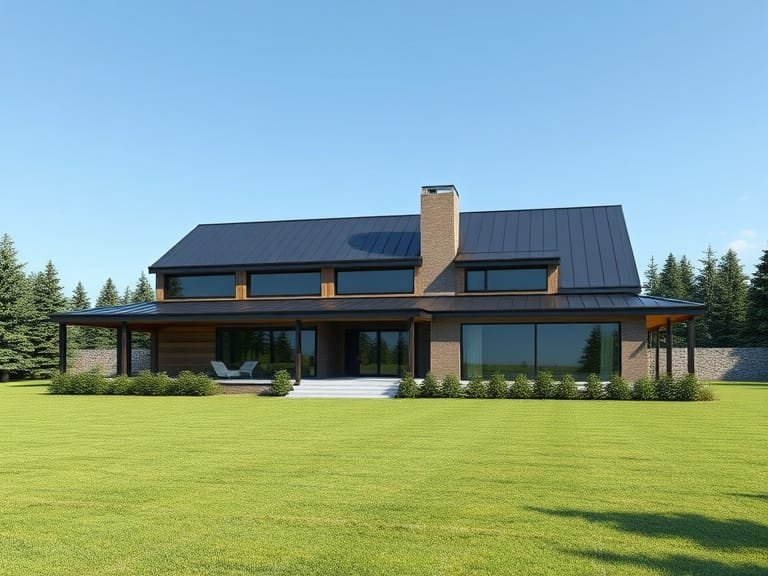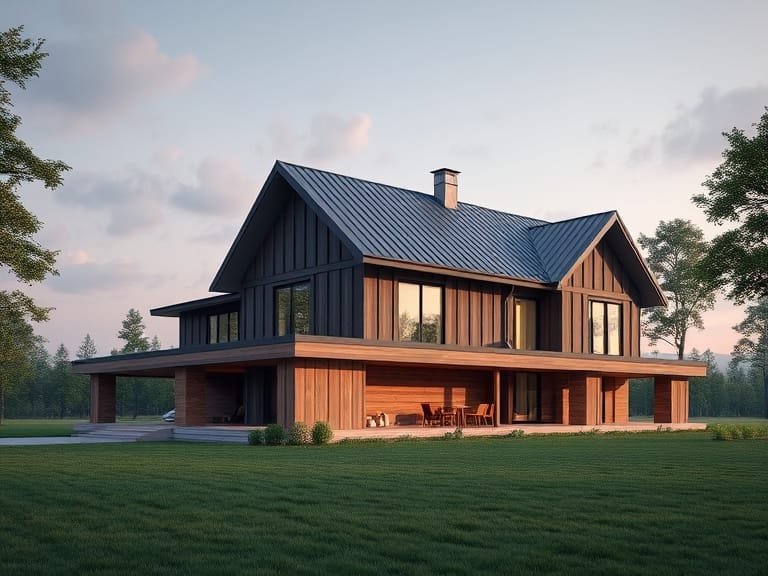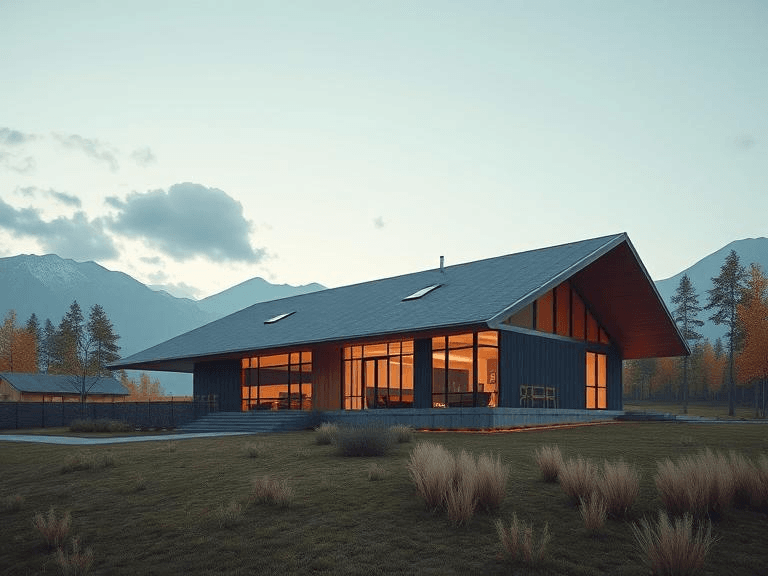
Metal roofing has emerged as a preferred choice for homeowners and commercial buildings due to its unique combination of durability, energy efficiency, and aesthetic appeal. One of the most significant advantages of metal roofing is its longevity. Unlike traditional roofing materials, metal roofs can last between 40 to 70 years, depending on the material used and the local climate. This durability translates into fewer roof replacements, ultimately reducing long-term costs.
Energy efficiency is another key benefit associated with metal roofing. Metal roofs are known for their ability to reflect solar radiant heat, which can significantly decrease cooling costs during warmer months. Moreover, many metal roofing products come with energy-efficient ratings, further enhancing their value. Homeowners looking to minimize their environmental impact will find that metal roofing materials can also be recycled, making them a sustainable option.
When considering metal roofing, various types are available, including steel, aluminum, copper, and zinc. Each type has its distinct characteristics and benefits. For example, steel roofing is typically more affordable and is known for its strength, while aluminum is lightweight and resistant to corrosion, making it ideal for coastal areas. Copper offers a unique aesthetic that develops a beautiful patina over time, while zinc is praised for its longevity and minimal maintenance requirements.
Choosing the right metal roofing contractor is essential for ensuring proper installation and maximizing the benefits of your new roof. An experienced contractor will possess a deep understanding of the nuances involved in metal roofing installation, from selecting suitable materials to expert craftsmanship. By partnering with a knowledgeable contractor, you can ensure that your investment in metal roofing pays off with lasting performance and beauty.
Researching Potential Contractors
When it comes to choosing the right metal roofing contractor, thorough research is essential to ensure you make an informed decision. One effective method for finding potential contractors is through online searches. Utilizing search engines, you can identify local contractors who specialize in metal roofing services. This approach allows you to gather a comprehensive list of candidates in your area, providing a solid starting point for your evaluation.
In addition to online searches, seeking referrals from friends, family, or neighbors can be invaluable. Personal recommendations often lead to discovering reputable contractors who have delivered satisfactory work. Engaging with your local community can provide insights into contractors’ quality, as well as their customer service and reliability. You might also consider consulting local hardware stores or roofing supply companies, as they often have connections with qualified contractors.
Another important step in the contractor selection process is checking local listings, such as those on Yelp or Angie’s List. These platforms provide users with the opportunity to view profiles of contractors, along with ratings and customer feedback. Reading reviews and testimonials is critical in gauging the reputation of potential candidates. Pay attention to the comments regarding timeliness, workmanship, and communication. High ratings and positive feedback are usually indicative of a contractor’s professionalism and quality of work.
Once you have compiled a list of potential metal roofing contractors, it is advisable to contact them directly. Discuss your roofing project, ask for estimates, and request references from previous clients. This step further helps in assessing the contractor’s expertise and reliability. By employing these research strategies, you will be better prepared to make an informed choice when choosing the right metal roofing contractor for your needs.
Evaluating Credentials and Experience
When it comes to choosing the right metal roofing contractor, evaluating their credentials and experience is paramount. The first step is to verify that the contractor holds the necessary licenses to operate legally in your area. Licensing not only indicates that the contractor is knowledgeable about local building codes and regulations but also confirms their commitment to professionalism. Different states have varying licensing requirements, so it’s crucial to ensure they meet the specific criteria applicable to your location.
Insurance is another critical factor to consider. A reputable metal roofing contractor should have both liability insurance and workers’ compensation coverage. Liability insurance protects you from financial loss in the event of property damage during the roofing project, while workers’ compensation ensures that any injuries sustained by workers on your property do not fall on your shoulders. Before making a decision, request proof of these insurances and verify their validity with the issuing companies.
Certifications can also signify a contractor’s expertise in metal roofing installation. Look for contractors who demonstrate affiliations with recognized industry organizations, such as the Metal Roofing Alliance (MRA) or similar institutions. These certifications often require specialized training and ongoing education, assuring you that the contractor is updated on the latest techniques and technologies in metal roofing.
Experience is another crucial metric when selecting a contractor. It is advisable to choose a contractor with several years of experience specifically in metal roofing, rather than general contractors who might not have the same level of expertise. Years in business can also indicate stability and reliability within the industry. Therefore, when you are choosing the right metal roofing contractor, prioritize those who focus on metal roofing projects, as they are more likely to deliver quality workmanship and expertise tailored to your unique needs.
Requesting and Comparing Quotes
When embarking on a roofing project, requesting and comparing quotes from various contractors is a pivotal step in the process of choosing the right metal roofing contractor. A well-structured quote can illuminate the costs and specifics associated with your roofing project, enabling you to make an informed decision. Begin by engaging multiple contractors who specialize in metal roofing to gather detailed proposals.
It is essential that each quote you receive includes specific information to ensure an accurate comparison. Firstly, the cost of materials should be outlined clearly, noting the type of metal being used and any additional components needed, such as underlayment or flashing. Next, the labor fees must be detailed, specifying whether the costs are calculated on an hourly basis or a flat fee for the entire project. Timelines for project completion should also be included, as these may vary significantly among contractors. A realistic timeline is crucial for effective planning and should account for potential delays due to weather or supply chain issues.
Moreover, warranty options are an important aspect of each proposal. A trustworthy contractor will provide details on both materials and workmanship warranties, safeguarding your investment and ensuring long-term satisfaction with your metal roof. Once you have gathered all the quotes, it is important to analyze them carefully. Look for any discrepancies in coverage or specific services provided. For instance, if one contractor offers a comprehensive warranty that others do not, this may be indicative of a higher level of service.
In comparing the proposals, ensure that they cover the same scope of work to maintain consistency in your evaluation. By taking the time to request and analyze detailed quotes, you can confidently move towards selecting the most suitable metal roofing contractor for your needs.

Checking References and Past Projects
When it comes to choosing the right metal roofing contractor, one of the most significant steps you can take is to check references and review past projects. This process not only provides insight into the contractor’s work quality but also helps build trust and confidence in their expertise. By reaching out to previous clients, you can gain an understanding of their experiences and the contractor’s reliability.
Start by asking the contractor for a list of references from recent projects. It is advisable to request at least three to five names to ensure a broad perspective. Once you have this information, contact each reference to inquire about their satisfaction with the contractor’s performance. Consider asking about the timeliness of the completion, the quality of materials used, and how any issues were handled. Questions such as, “Did the contractor communicate effectively?” or “Were there any unexpected costs?” can reveal a lot about their working practices.
Additionally, evaluating the contractor’s past projects is crucial. If possible, arrange site visits to inspect the completed roofing installations firsthand. Observing their work up close can offer essential insights into the contractor’s craftsmanship, attention to detail, and adherence to safety standards. If visiting sites is not feasible, request photographs of completed installations. Ensure the images showcase various angles and details that reflect the quality and workmanship involved.
Furthermore, look for online reviews and testimonials on reputable platforms. This broader feedback can help you gauge the contractor’s reputation within the community. Ultimately, thorough reference checks and an assessment of past projects will empower you to make an informed decision when choosing the right metal roofing contractor.
Understanding Warranties and Guarantees
When engaging a metal roofing contractor, it is essential to consider the warranties and guarantees associated with the roofing system. These warranties typically fall into two categories: manufacturer warranties and contractor warranties. Understanding these distinctions is vital for protecting your investment and ensuring you are satisfied with the work performed.
Manufacturer warranties cover the materials used in the roofing installation. These warranties usually specify the lifespan of the metal products, any potential defects, and the conditions under which the warranty is valid. Most reputable manufacturers provide warranties that can range from 20 to 50 years, depending on the type and quality of the material. It is crucial to thoroughly read the fine print, as these warranties may have specific maintenance requirements that need to be adhered to in order to remain valid. A strong manufacturer warranty ensures that, should any issues arise with the metal roofing materials, the cost of repairs or replacement may be covered, thus safeguarding your investment.
On the other hand, contractor warranties are focused on the workmanship associated with the installation process. A skilled metal roofing contractor should offer a warranty that guarantees their workmanship for a specified period, which can range from one year to a decade. This warranty indicates that if any issues, such as leaks or improper installation, arise during the warranty period, the contractor will be responsible for rectifying those problems at no additional cost. A solid workmanship warranty reflects the contractor’s confidence in their abilities and commitment to customer satisfaction.
In conclusion, the significance of understanding both manufacturer and contractor warranties cannot be overstated when selecting a metal roofing contractor. These warranties not only protect your investment but also assure you of the quality and durability of your roofing system over the years.
Evaluating Communication and Professionalism
When selecting a metal roofing contractor, evaluating their communication and professionalism is paramount. Effective communication is essential throughout the roofing process, as it sets the tone for the project and greatly influences its success. A contractor’s ability to articulate their process, timelines, and plans can indicate how they will manage the project from start to finish. Therefore, assessing these attributes during the initial interactions is crucial.
Start by observing how responsive the contractor is to your inquiries. Are they quick to return phone calls or emails? A reliable contractor should demonstrate a commitment to communication, showing attentiveness to potential clients. If they are slow to respond or difficult to reach, it might be a sign of how they prioritize their work and manage client relationships once the project is underway.
In addition to responsiveness, the quality of the contractor’s communication is important. Clarity and transparency are keys. A good metal roofing contractor will take the time to explain the project scope, timelines, materials, and any variations that may arise. Pay attention to whether they provide detailed contracts and estimates and whether they openly discuss costs and potential challenges. This proactive approach can help build trust and avoid misunderstandings later in the project.
Professionalism also encompasses the contractor’s demeanor during interactions. A courteous and respectful contractor is likely to extend that same level of professionalism to their team and the job site. Take note of how they present themselves and interact with you and their colleagues. This behavior can often reflect the overall culture of the business and its commitment to quality workmanship.
By focusing on these aspects of communication and professionalism, you can make a more informed decision when choosing the right metal roofing contractor for your project. Clear and respectful communication can lead to a smoother process and a successful outcome.
Finalizing the Contract
Finalizing a contract with your selected metal roofing contractor is a crucial step that can significantly influence the success of your roofing project. A well-structured contract should contain specific elements that define the responsibilities and expectations of both parties. One of the most important aspects is a clear scope of work. This section should detail every element of the project, including the type of materials to be used, their specifications, and the overall design, ensuring that there is no ambiguity regarding what the contractor is obliged to deliver.
Another essential component to consider is the payment schedule. It is advisable to establish payment milestones tied to the completion of specific phases of the project. This approach not only provides transparency but also helps in stimulating progress, as payments should correlate with the delivery of work. Make sure to document the total cost of the project and any potential additional expenses that could arise during the roofing installation. By having this information detailed in the contract, both parties can avoid misunderstandings later on.
A comprehensive project timeline is also a vital inclusion in the contract. This timeline should outline start and finish dates, as well as deadlines for different project phases. Such clarity helps uphold accountability and ensures both the contractor and the homeowner have mutual expectations regarding the project timeframe. Additionally, it is prudent to include clauses that address potential changes in the scope of work or unforeseen issues that may arise. These clauses provide guidance on how changes will be handled, ensuring that both parties understand the procedures for possible adjustments in the project’s execution.
Ultimately, ensuring these elements are solidified in your contract will facilitate a smoother working relationship with your metal roofing contractor and contribute to the success of your roofing project.
Post-Installation Follow-Up
Once the installation of your metal roofing system is complete, it is critical to engage in a thorough post-installation follow-up with your chosen metal roofing contractor. This ensures that not only is the job completed to your satisfaction, but it also provides an opportunity to clarify any remaining questions regarding the roofing system. A final walk-through is an essential step in this process, allowing you to examine the installed roof along with the contractor, discarding any concerns about installation quality and adherence to expectations. This step guarantees comprehensive satisfaction with the finished product.
Moreover, it is essential to understand the importance of ongoing maintenance and inspections for your metal roofing. Although metal roofs are known for their durability, regular maintenance is vital to preserve their longevity and functionality. You should discuss with your contractor a maintenance schedule that includes periodic inspections to identify any wear or potential issues early. Common upkeep tasks may include cleaning gutters, checking for rust or corrosion, and ensuring that fasteners are secure. An effective maintenance plan not only prolongs the life of the roof but also safeguards your investment.
In the event issues do arise post-installation, communicating these concerns promptly with your contractor is of utmost importance. Whether it’s a leak, aesthetic imperfections, or wear and tear, addressing problems early on can prevent more extensive damage and costly repairs. A reputable contractor will be willing to assist in rectifying problems and may offer warranties or service agreements that cover post-installation maintenance. This partnership ensures that your metal roofing remains secure and effective for years to come, making the process of choosing the right metal roofing contractor worth the effort in securing a quality installation and enduring relationship.


